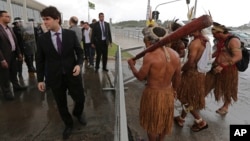Brazil has announced changes to the procedure for demarcating indigenous lands in a move campaign groups fear will weaken the land rights of communities facing mounting pressure from illegal logging and big agricultural operations.
Under the decree, demarcation of indigenous lands will be decided by the Ministry of Justice rather than the National Indian Foundation (FUNAI), a government body set up to carry out policies relating to Brazil's 900,000 indigenous people.
Supporters of the decree, which was published in the government's Official Gazette on Wednesday, said the change would improve agricultural investment in rural areas of the recession-hit nation by better safeguarding land investments.
Activists, however, said the change weakened the land rights of indigenous people to benefit large landowners in Brazil, the world's top exporter of soy, coffee, sugar and tobacco.
"We feared the government would take this brazen step to deeply undermine indigenous land rights," said Christian Poirier of the U.S.-based campaign group Amazon Watch.
"The ruralistas [politicians linked to agriculture interests] are the clear winners of this move," Poirier told the Thomson Reuters Foundation.
Heartland lobbyists laud changes
The Federation of Agriculture and Livestock of Matto Grosso do Sul, a lobby group in Brazil's farming heartland, welcomed the changes as an "important advance."
About 13 percent of Brazil's land had been set aside for the country's indigenous people based on the territories they historically occupied.
Before the change was announced, demarcation of indigenous lands was based on FUNAI's research drawn from technical and anthropological analysis.
Under the new procedure, demarcation will be decided by the Justice Ministry based on the recommendations of experts from a new specialized technical working group — leaving it open, critics say, to influence from major farming lobby groups.
Giving more power over the country's land to farmers and ranchers will hurt Amazon protection efforts, environmentalists say, as land formally demarcated to indigenous groups has a stronger record for rainforest preservation than other areas.









